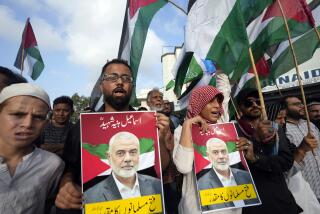‘This Is a Sad Day for the United Nations,’ Annan Says
- Share via
UNITED NATIONS — As he strode into the Security Council on Wednesday for emergency consultations on Iraq, U.N. Secretary-General Kofi Annan was asked if there was still room for diplomacy.
“We will find out in the council chamber,” he said.
The answer came shortly before 5 p.m., just as Russian Ambassador Sergei V. Lavrov was beginning to question Richard Butler, the chief U.N. weapons inspector who had concluded in a bluntly written report released Tuesday night that Baghdad had failed to cooperate with his arms monitors.
Butler had hardly finished a sentence in the Security Council chamber when Annan stood up and said he had to leave. As he emerged from the chamber, just about every cell phone in the room started to ring in a raucous chorus of technology.
“They should ban cell phones hereafter,” a Chinese diplomat said.
British Ambassador Jeremy Greenstock asked for a recess of 10 or 15 minutes so he could receive new instructions from London.
“So the report has played its role,” Lavrov, whose nation is Iraq’s strongest supporter on the council, said acidly.
Strangely, there is no TV set in the Security Council. It is a room designed for deliberation and debate. But elsewhere throughout the U.N. complex, hundreds of TVs were showing the green night-scope pictures of antiaircraft fire in Baghdad on the day diplomacy failed.
The attack underscored a reality of the United Nations since its founding in 1945: Big powers have their own vital interests and, when challenged, are not afraid to use force.
Before the raids began, Iraqi Ambassador Nizar Hamdoun met with Annan and emerged speaking grimly.
“It looks like the United States is determined to go for a military strike regardless of what the Security Council thinks about it, and that’s very bad,” Hamdoun said.
“I told [Annan that] Iraq has nothing more to do, nothing to provide any new factor. It is up to the council. It is up to the secretary-general to bear the responsibilities,” Hamdoun said.
Hamdoun termed his discussion with Annan an exchange of views.
“There is nothing new to add to the situation,” he said.
When they learned of the attack, council members quickly left the room.
Some diplomats asked reporters waiting outside what they had learned. Lavrov called for a formal meeting of the council to consider the attack.
In the hallway just outside the chamber, Chinese Ambassador Qin Huasun sharply criticized the United States and Britain.
“There is absolutely no excuse for the pretext to use force against Iraq,” the ambassador said angrily. “The use of force has serious consequences and also poses a threat to international peace as well as regional stability.”
More than two hours after U.S. and British forces launched their strikes, Annan, who traveled to Baghdad in August and won pledges of cooperation from President Saddam Hussein’s government, read a short statement.
“This is a sad day for the United Nations and for the world,” he said. “It is also a very sad day for me personally. Throughout this year, I have done everything in my power to ensure peaceful compliance with Security Council resolutions and to avert the use of force.
“What has happened cannot be reversed,” the secretary-general added.
“Nor can any of us foresee the future. All we know is that tomorrow, as yesterday, there will be still an acute need, in Iraq and in the wider region, for humanitarian relief and healing diplomacy.”
More to Read
Sign up for Essential California
The most important California stories and recommendations in your inbox every morning.
You may occasionally receive promotional content from the Los Angeles Times.













